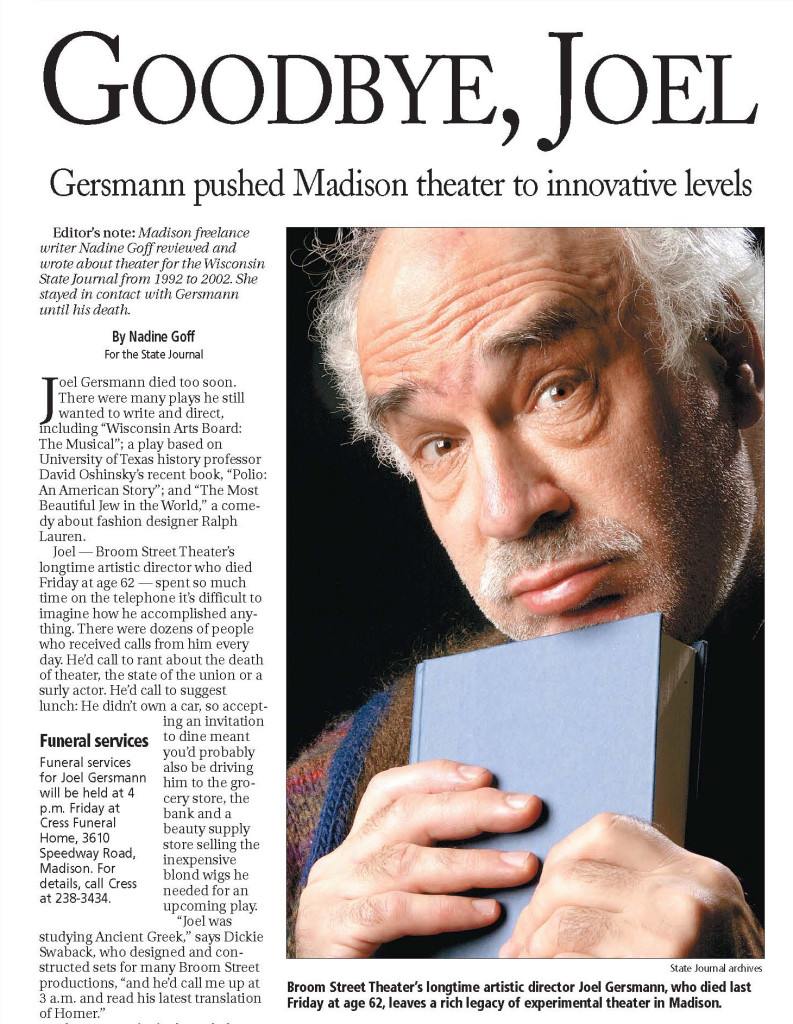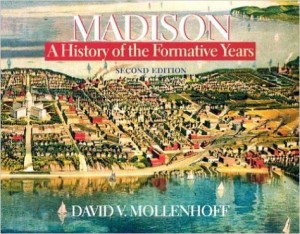 Joel Gersmann hated blogs: He thought they were filled with scurrilous gossip and the inane, meandering thoughts of people who, if they really wanted to write, should be writing serious stuff…like plays, and novels — or at least articles about his beloved Broom Street Theater.
Joel Gersmann hated blogs: He thought they were filled with scurrilous gossip and the inane, meandering thoughts of people who, if they really wanted to write, should be writing serious stuff…like plays, and novels — or at least articles about his beloved Broom Street Theater.
Joel died four years ago today. Were he still alive, I think he would have changed his mind about blogs — and he probably would have a Facebook page for the theater if not himself. Once he began to see how useful and effective the Internet could be for disseminating news about Broom Street Theater, as well as locating obscure, out-of-print books and CDs, he would have twisted arms and convinced people to blog on his behalf while he used his mighty intellect to create new plays and finish translating Homer.
But, as I’ve said before, Joel died too soon. Four years ago, I poured all my grief and energy into writing a tribute to him for the Wisconsin State Journal. Trying to cram everything I felt needed to be said into 1,000 words was a formidable challenge.
The State Journal was consistently generous about giving me plenty of space for feature stories, but occasionally there wasn’t quite enough room on the page and some paragraphs had to be cut. In this instance, some of the content of an accompanying sidebar, featuring observations about Joel from a wide range of people he’s worked with over the years, also had to be excised. Tonight, for those of you who remember Joel and those of you who are, alas, just being introduced to him now, I’m going to post the original, uncut version of my story, as well as the complete sidebar content — and since this is a blog on the Internet, I’m going to add some links, too.
Goodbye, Joel (the original version)
Joel Gersmann died too soon. There were many plays he still wanted to write and direct, including “Wisconsin Arts Board: The Musical;” a play based on University of Texas history professor David Oshinsky’s recent book, “Polio: An American Story;” and “The Most Beautiful Jew in the World,” a comedy about fashion designer Ralph Lauren.
Joel spent so much time on the telephone it’s difficult to imagine how he accomplished anything. There were dozens of people who received calls from him every day. He’d call to rant about the death of theater, the state of the union, or a surly actor. He’d call to suggest lunch: He didn’t own a car, so accepting an invitation to dine meant you’d probably also be driving him to the grocery store, the bank, and a beauty supply store selling the inexpensive blond wigs he needed for an upcoming play. Or maybe he’d interrupt your sleep to read you a poem.
“Joel was studying Ancient Greek and he’d call me up at 3 a.m. and read his latest translation of Homer,” says Dickie Swaback, who designed and constructed sets for many Broom Street productions.
Whenever Joel telephoned, there would be music playing in the background. He was passionate about classical music, opera, jazz, and folk music, as well as modern dance. His knowledge of these subjects was encyclopedic. He preferred the new, the offbeat, and just plain weird. He was eagerly awaiting the arrival of a CD by The Suspicious Cheese Lords.
An avid reader, he sometimes fretted that more people knew him for the annual book review essay he wrote for the Isthmus newspaper for 28 years than for his work at Broom Street Theater.
The amount of work he did at and for Broom Street Theater was prodigious, despite all his other interests and activities, including a recent addition: learning Arabic.
During his 36 year tenure as Broom Street’s artistic director, Joel wrote and directed 88 original plays. Additionally, he made and directed 26 adaptations or versions of famous plays for the theater. He also directed four plays for Quixote Productions and was hired to direct a nationally broadcast radio play with a cast that included actor Laurence Luckinbill. This was not an entirely pleasant experience for Joel.
“Luckinbill was one of the people he hated most after that,” remembers Jacques Burdick, a retired theater professor who earned his Ph.D. at UW-Madison. Burdick met Gersmann when Joel enrolled in the masters degree program in theater arts at Adelphi University after spending two years in the U.S. Army.
Burdick, who Joel called “my mentor” (and telephoned every day) says, “Joel went to Madison because I went there and because I knew A.C. Scott who taught Asian theater history in Madison at the time.”
But Burdick influenced more than Joel’s decision to go to Madison. “I can only surmise that something I did at Adelphi set him off — and I think it was studying Grotowski’s investigations of what it means to be doing theater with next to nothing.”
Grotowski developed a concept he called poor theater. He believed theater could happen without costumes, scenery, or stage lighting: All theater required was a live communion between an actor and an audience in a special place.
“Broom Street’s tradition is about cheap, curtainless theater,” says Rod Clark, who has acted in, written, and directed many plays at Broom Street and currently serves as the chair of its board. Clark met Joel in Madison is 1967 when they were both involved in “the cultural side of the revolution,” whose members resisted the rigidity of the political left.
“We didn’t want to be constrained by what was appropriate,” says Clark.
Two of Joel’s first plays for Broom Street were “Junk Show” and “Junk Show II.” He said he coined the term “junk theater” to describe his work after reading George Orwell’s observations about junk culture.
But his work was constantly changing, evolving. Joel believed his most recent play, “The Ballerina and the Economist,” was vastly different, for instance, from his controversial 1988 production of “Joe, A Life or Angel on the Edge, the story of Senator Joe McCarthy of Wisconsin.” It was more layered with meaning and highly choreographed.
To all of the above, it’s necessary to add that Joel ran the theater: raised money, paid the bills, handled the publicity, made certain the theater building was well-maintained. He lived frugally, but for many years worked at day jobs in order to keep the theater going.
“You can’t produce theater year after year that people hate,” says Clark.
But Joel was unwilling to compromise.
“I’m not going to throw myself on the railroad tracks and get hysterical,” he said recently. “At 62, I’m just not going to reinvent theater for 21st century yuppies.”
“And the miracle is that the theater survives in the black, ”says Clark. And Broom Street Theater remains the only company in Madison that owns its own building.
“Buying that building was a leap of faith,” says Mary Berryman-Agard, former chair of the Madison Arts Commission. “It was a decision without which there wouldn’t have been a Broom Street Theater today. Joel’s real genius was his administrative skills.”
If you’ve read this far and your favorite Joel story isn’t here, don’t fret. There’s more to come. The Broom Street boys are already speculating who’ll be the first to write and direct “The Joel Gersmann Story” and whether it might make it to the stage before the end of the year.
Sidebar: Remembering Joel
Film director Stuart Gordon, who, in partnership with his wife, Carolyn Purdy-Gordon, co-founded Broom Street Theater in 1968, and then left after directing one play:
“Joel was one of the few remaining people in theater who continued to experiment with new forms. He never sold out, or softened his views, or went commercial.”
“Theaters are like children and Joel really saw it through. I was like the traveling salesman who got the farmer’s daughter pregnant and then abandoned her. Joel married her and raised the kids.”
Rob Matsushita, playwright, director, actor, and sometimes gunmaster at Broom Street since 1995:
“Joel was a uniter. I think I learned more from him about human character than theater. He could make people who didn’t get along work together. We united together for a reason: we were angry with Joel. He wanted you to be angry, to fight. Joel believed that if you didn’t fight for something you didn’t really want it.”
Mary Berryman-Agard, arts consultant and former chair of the Madison Arts Commission:
“Joel was a completely non-sentimental person, but he had a fundamentally sweet and tender engagement with the world, all appearances to the contrary aside.”
JoAnn Schmidman, founder (in 1968) of one of the oldest and long lived experimental theaters in the United States, Omaha Magic Theatre:
“Joel was an unheralded genius. He was one of the most giving and caring souls I’ve known.”
Callen Harty, playwright, director, actor at Broom Street since 1983:
“The one thing I think about often is Joel’s mentorship role — how many lives have been changed because of him.”
Megan Terry, a founding member of New York City’s now legendary Open Theater:
“Joel Gersmann and Joseph Chaiken are two of the geniuses of the American theater, both working at opposite ends of the spectrum.”






Fantastic article about a great theater genius and wonderful person. Joel Gersmann was one of a kind. Thank you very much for remembering Joel. He's been gone 6 years now; hard to believe, and a very sad loss.
Grateful for ‘remembering Joel..” although I didn’t know him. I do remember the Broom Street theater/neighborhood. I grew up not far from there and as recently as the late 70’s lived, loved and laughed near there. Joel must have been the perfect Willie St area accompaniment, what a zany place. Definitely, not always the happiest place on earth but thanks to gentle souls like Joel, and from more recent visits in 2010, it seems to have turned the corner.